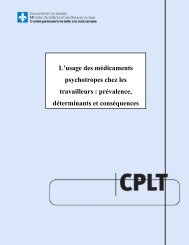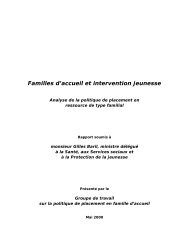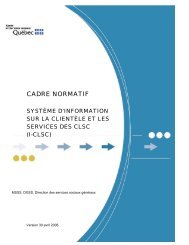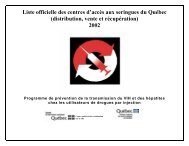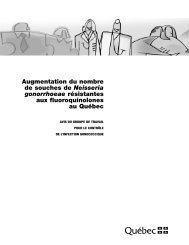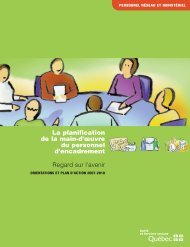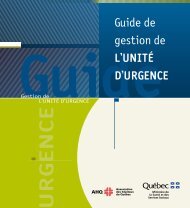De l'innovation au changement - Gouvernement du Québec
De l'innovation au changement - Gouvernement du Québec
De l'innovation au changement - Gouvernement du Québec
You also want an ePaper? Increase the reach of your titles
YUMPU automatically turns print PDFs into web optimized ePapers that Google loves.
Projet 19<br />
<strong>De</strong>velopment and Evaluation of Cultural Consultation Service in Mental Health, région de Montréal<br />
Développement et évaluation d'un service de consultation culturelle en santé mentale<br />
1. CLIENTÈLE VISÉE Les familles (enfants et a<strong>du</strong>ltes) : nouve<strong>au</strong>x arrivants, immigrants et réfugiés, les commun<strong>au</strong>tés culturelles établies depuis plus longtemps <strong>au</strong><br />
Québec et les commun<strong>au</strong>tés <strong>au</strong>tochtones.<br />
2. BUDGET ALLOUÉ 453 676 $<br />
Type de projet : intervention - évaluation<br />
3. CONTEXTE D’ÉMERGENCE<br />
3.1 Pourquoi le <strong>changement</strong> The reports of the Federal Task Force on Mental Health Issues Affecting Immigrants and Refugees and of the Comité de Santé <strong>du</strong> Québec<br />
indicated the need to develop culturally sensitive health care for all citizens . <strong>De</strong>spite the policy of equal access to care for everyone,<br />
significant barriers to care continue to exist across Canada for Aboriginal peoples, immigrants, refugees and ethnocultural minorities by reason<br />
of language, culture and ethnicity . Beyond the need for basic research on models of care for culturally appropriate and accessible mental<br />
health services, there is a need to improve the process of diagnosis and treatment in cross-cultural psychiatry (Rogler, 1996).<br />
3.2 Principales caractéristiques The principle objective of the service was to improve the accessibility and cultural appropriateness of mental health services for the<br />
multicultural population of Montreal, including immigrants, refugees, and ethnocultural groups, as well as Aboriginal peoples.<br />
The specific objectives of the project were: 1) to facilitate access to cultural expertise in mental health by developing a network of clinicians,<br />
databases and internet resources, 2) to offer ongoing professional training and to promote the development of competency in intercultural<br />
intervention among mental health practitioners, particularly those who offer front line or primary care services<br />
NOTE : On évalue et décrit les résultats de trois différents modèles de service, dont un seul a été implanté à l’aide de la subvention <strong>du</strong> FASS.<br />
Les objectifs et les résultats seront identifiés comme suit : Jewish General Hospital (JGH : Service I), the Montreal Children’s Hospital (MCH :<br />
Service II), et Hôpital Jean-Talon (HJT : Service III)<br />
The project had three main activities corresponding to our major goals:<br />
I. A new Cultural Consultation service was established at the Jewish General Hospital. Specialized cultural consultation services were then<br />
evaluated and compared at the Montreal Children’s Hospital, the Jewish General Hospital, and Hôpital Jean-Talon.<br />
II. A database of community organizations, professionals and resource persons with expertise in culture and mental health was prepared and<br />
a website for access to this information was created.<br />
III. A comprehensive review and systematic comparison of training programs in culture and mental health was con<strong>du</strong>cted and training activities<br />
devised for specific groups of practitioners.<br />
The JGH has used a consultation-liaison model and emphasized integrating the perspectives of medical anthropology with conventional<br />
psychiatric, cognitive behavioural and family systems perspectives.<br />
The MCH has emphasized a pluralistic approach and focused on providing flexible services for immigrant and refugee children, especially<br />
those who have suffered organized violence. It has worked closely with schools and community organizations to integrate community<br />
resources and perspectives.<br />
The HJT has adapted an ethnopsychoanalytic model that uses a multicultural group of clinicians and people accompanying the patient to<br />
reframe the problem from multiple points of view, and mobilize the cultural frames of reference of the patient and his or her entourage.<br />
97





